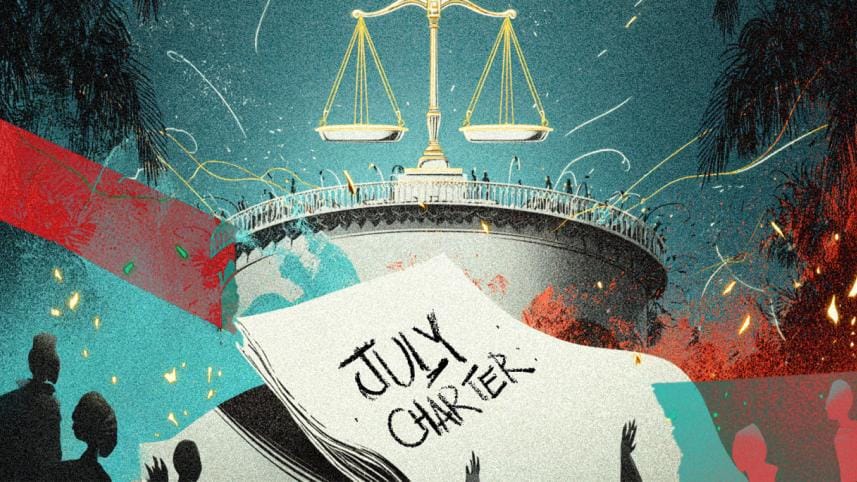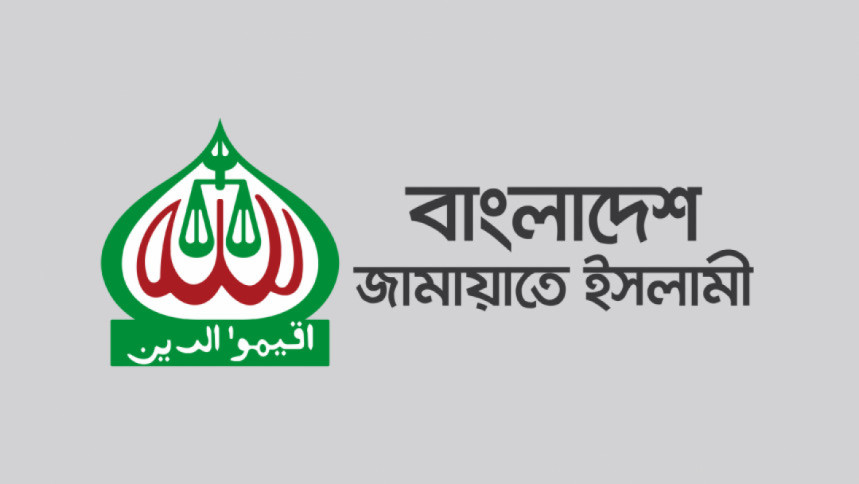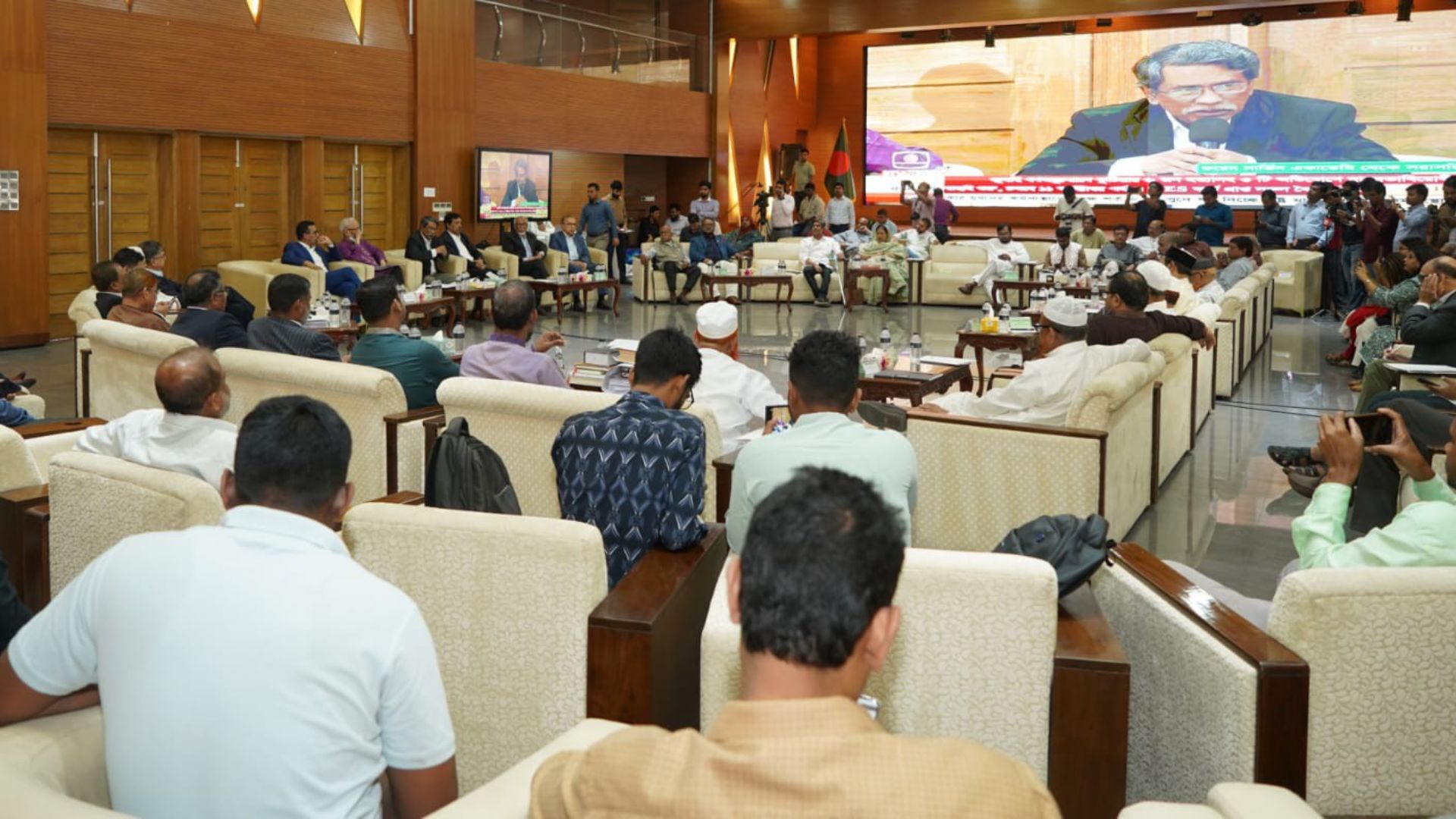Parties agree to referendum on July Charter

Political parties have reached a consensus on holding a referendum to secure public consent for implementing the July Charter, National Consensus Commission Vice-President Prof Ali Riaz has said.
However, differences remain over the timing of the referendum.
While the BNP and several other parties want it to be held on the same day as the national election, Jamaat-e-Islami prefers it before the polls to ensure the charter's implementation before the next government takes office.
The NCP did not clarify whether it wants the referendum to be held before the polls, or on election day.
If the referendum is held on election day, voters will cast a separate ballot to answer "Yes" or "No" on whether they support the charter. The party forming the next parliament will then implement the charter, said commission members.
After a meeting with the political parties at the Foreign Service Academy yesterday, Riaz said, "All political parties have agreed to hold a referendum to seek the people's approval. We see this as the first major step in the implementation process."
Expressing hope that the parties would reach consensus on other issues as well, he said the commission will send specific recommendations on implementation of the charter to the government soon.
Riaz also said there is now a "virtual consensus" among the parties that the parliament to be formed after the February election will bring reforms in such a way that the changes will be sustainable.
The charter contains 84 reform proposals -- half requiring constitutional amendments and the rest executable through existing laws or government orders.
Before yesterday's breakthrough, the talks had been deadlocked over how to move forward with the constitutional reforms. After meetings on September 11, 14, and 17, the political parties were given some time for internal discussion.
To end the impasse, the commission had proposed issuing a Constitutional Order and holding a referendum on the order alongside the general election.
At that time, the BNP rejected the proposal, calling it a potential "constitutional disorder" and a "bad precedent," while the Jamaat-e-Islami backed the idea but demanded the referendum before the polls. The National Citizen Party had initially remained undecided, saying it would seek legal advice.
Riaz said that although some parties had previously wanted to seek the Supreme Court's opinion under Article 106 of the constitution, most now believe that that step may no longer be necessary.
Thanking the parties, he said, "The political parties have stepped back from rigid stances and played a role in building national consensus."
He added that the commission briefed Chief Adviser Prof Muhammad Yunus on the progress earlier in the day. Yunus welcomed the breakthrough and urged the commission to finalise its recommendations quickly.
The commission will hold its next meeting with political parties on Wednesday and, in the meantime, consult its expert panel to work out legal and constitutional details. It aims to submit its final report by October 15.
TIMING
Many parties, including the BNP, now agree that the referendum should coincide with the national polls, but Jamaat-e-Islami insists it be held before the announcement of the election schedule.
BNP Standing Committee member Salahuddin Ahmed said the referendum would ensure that the charter has genuine popular backing.
"There is a question of whether all political parties together truly represent the entire population. If we can seek approval from the people, then that will be the final opinion on implementing the July Charter," he said.
He clarified that no constitutional amendment is needed for holding a referendum. "The fascist Awami League government had removed the referendum provision under article 142, but a High Court verdict has reinstated it. There is no clause preventing a referendum. Therefore, an ordinance can authorise the Election Commission to hold it on a separate ballot alongside the parliamentary election."
Asked whether MPs in the next parliament who oppose the July Charter would be obliged to accept the public verdict, he said, "All Members of Parliament will be bound to accept it. When the people say, 'Yes,' parliament and its members must accept it."
He also noted that the constitution does not even allow any court to question parliament's proceedings.
On notes of dissent attached to specific reform clauses of the charter, Salahuddin said, "The charter will be drafted, signed, and endorsed by all as a declaration, published online and included in party manifestos.
"People will know what is in the July Charter. Those who receive the mandate can act according to their notes of dissent."
The BNP had initially insisted that constitutional reforms could only be made through the next parliament and supported seeking the Supreme Court's opinion on whether any other path was possible.
The Jamaat said the referendum should be held before the polls, preferably in November or December, to lend "strong legitimacy" to the charter.
Jamaat's Assistant Secretary General Hamidur Rahman Azad added his party would "accept the people's verdict regardless of the outcome".
The NCP has yet to say whether it wants the referendum held before the polls or on election day. Its joint convener, Sarwar Tusher, said most parties now agree that the charter must first be "legally ensured."
He reiterated that the next parliament should serve a dual role -- both legislative and constitutional -- since reforms such as the prime minister's term limit, formation of an upper house, and High Court's decentralisation require more than simple amendments.
The NCP supports implementing the charter through a Constituent Assembly, arguing that the next parliament could serve as a Constituent Assembly along with a regular legislature.




 For all latest news, follow The Daily Star's Google News channel.
For all latest news, follow The Daily Star's Google News channel. 


Comments